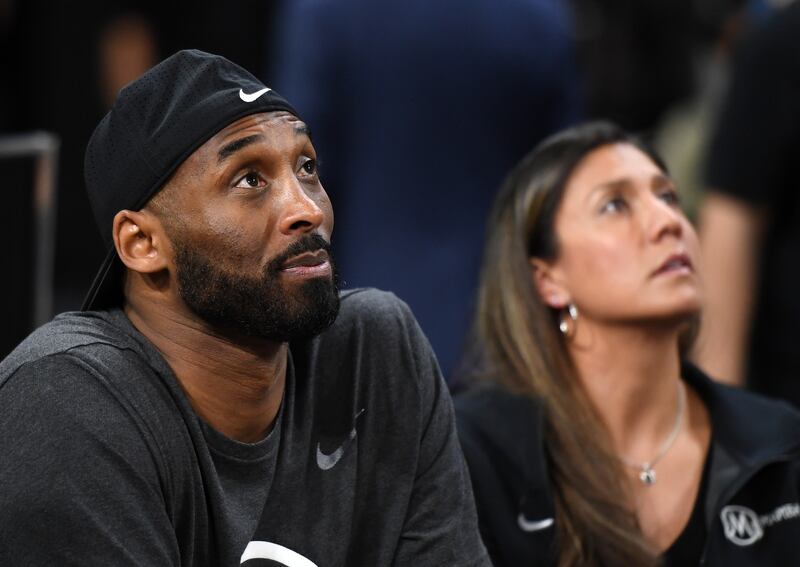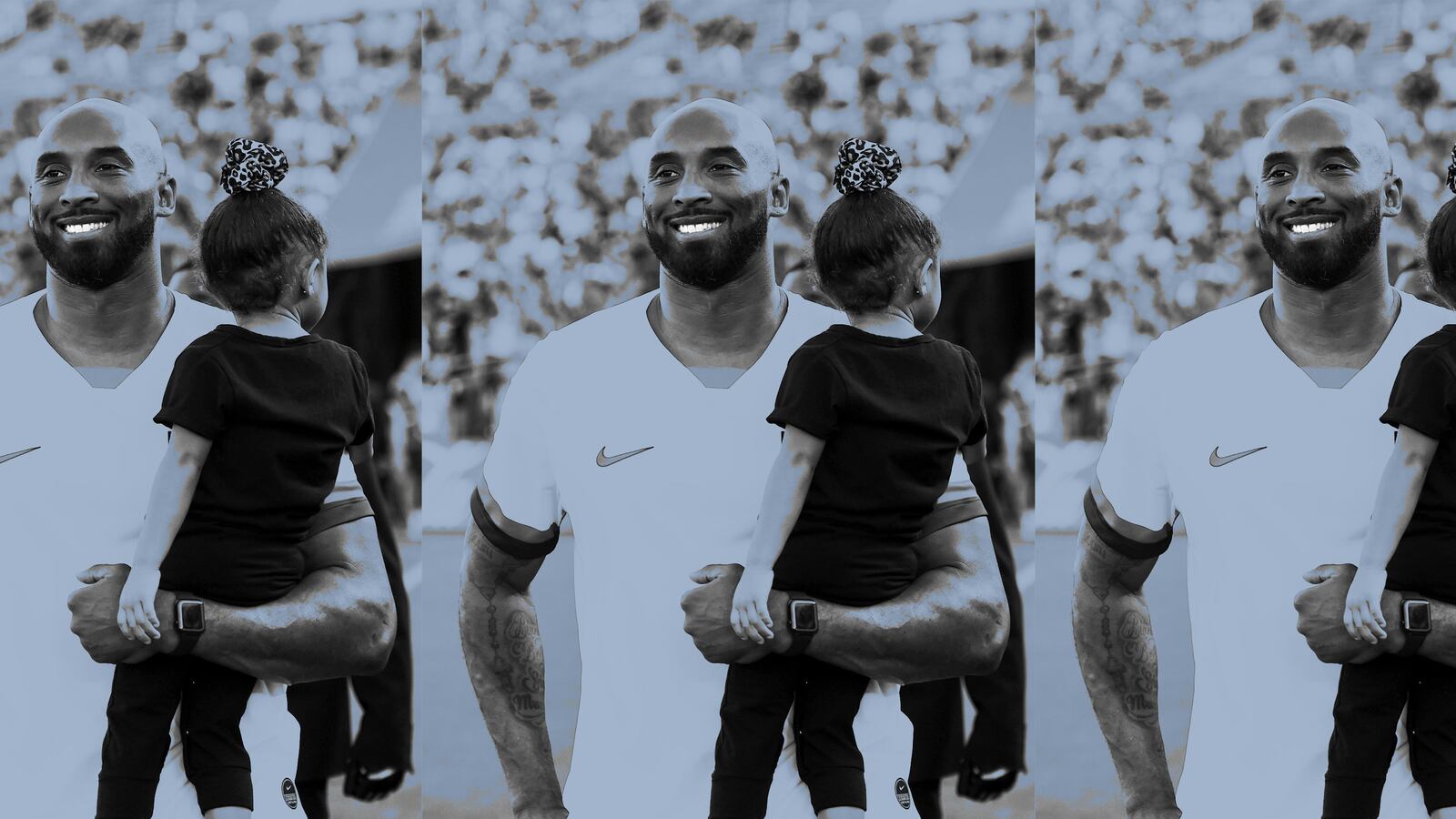If you’ve followed the WNBA at all this season, it’s likely you’ve seen a familiar face popping up all over the league’s social media feeds, on teams’ Instagram accounts, and on your TV screen with courtside seats. He’s an NBA player who spent 20 years with the Los Angeles Lakers, won five championships, was an 18-time All-Star, and has transitioned into a role as an analyst at ESPN post-retirement. He also faced a very credible rape allegation, which he all but admitted was true.
Yes, Kobe Bryant is being used as an ambassador-of-sorts for women’s sports—and women's basketball, in particular—and that’s a problem, considering he’s never done any repair work regarding his past. There’s Bryant in the locker room after an Aces game, posing for a group photo with the team. And there he is being interviewed courtside at the WNBA All-Star Game. Here he is this spring in ESPN’s NCAA Women’s March Madness commercial, featured so prominently he might as well be the face of it. Oh, and being interviewed courtside at a UConn game. Here he is at the USWNT game last weekend with his daughters.
Aside from the fact that it’s weird to make a male athlete the face of a women’s sport, the fact is that Bryant faced a disturbing rape allegation. His accuser had bruises on her neck and jaw, lacerations in her vagina, and she was smeared for months by the press and by Bryant’s defense team. He essentially confirmed her story with a statement that was read by Bryant’s attorney in court: “Although I truly believe this encounter between us was consensual, I recognize now that she did not and does not view this incident the same way I did,” Bryant wrote. “After months of reviewing discovery, listening to her attorney, and even her testimony in person, I now understand how she feels that she did not consent to this encounter.”
I am far from the first person to make the point that Bryant is the wrong ambassador for the sport of women’s basketball. Over at Swish Appeal, Cat Ariail laid out the complicated nature of wanting to use one of the all-time NBA greats to boost the profile of the women’s game with the reality of who that player is and what he’s allegedly done. When the NCAA commercial ran this spring, Morgan Campbell at The Star wrote that it’s “logical to question whether a famously selfish basketball player—a man once accused of sexual assault—is the ideal male cheerleader for the women’s game, and whether the TV spot is actually a brand-building exercise for Bryant as he polishes his post-retirement public image.”
(When asked for comment by The Daily Beast, the NCAA said, “The video to promote the championship was produced by ESPN for promotion of the championship on the various ESPN channels/platforms. ESPN also connected with Kobe in regard to his participation in the project.” When I asked ESPN last year whether Bryant’s past rape allegation was taken into consideration when they greenlit his show on their streaming platform, ESPN+, the network declined to comment.)
But there are two pieces I want to add to this conversation and expand on why and how Bryant embedding himself in the world of women’s basketball rubs me the wrong way. When Bryant talks about why he cares about women’s sports, he’s clear about his reason: he has daughters and he wants them to see what is possible. “It’s great, as a parent, to be able to see my daughter pull inspiration from [the athletes],” Bryant told the Hartford Courant. When they go to women’s basketball games together, he often takes the time to visit the locker room and meet the athletes.
His desire to uplift the women’s game does not seem to be rooted in any desire to make amends for past harm he may have caused women. It’s simply because he has daughters. The “I care about women now because I have a daughter” thing is one of the most oft-used fallbacks for men who have been accused of bad behavior, and it is the absolute lowest bar possible for human decency. It’s great that having girl children has opened his eyes to the ways in which female athletes are unfairly treated, overlooked, and not given the same resources as their male counterparts. It’s also great that he’s trying to use his status in the world of basketball to change that.
But it shouldn’t take having a daughter to make a man realize that female athletes deserve the same respect as men. And in the case of Bryant, specifically, using his daughters in this way makes them part of his post-retirement redemption arc, the one in which he entrenches himself firmly as the male face of women’s basketball. He is using his daughters to help people forget about his past transgressions or misdeeds, to replace the narrative of Bryant as a probable rapist with Bryant as an advocate for women. That’s not fair to them.
With that said, it’s not that Bryant shouldn’t necessarily be an advocate for the women’s game. And there’s nothing wrong with wanting to make amends for past actions. The rape allegations were a long time ago. People are capable of change. But Bryant hasn’t actually done anything to demonstrate that he has grown since 2003. He has not made any public amends, he hasn’t given a statement about what he’s learned and how he plans to be different going forward, there have been no donations to RAINN. He hasn’t put in the work to make the public willing to forgive him or move past his past.

Kobe Bryant attends a game between the Los Angeles Sparks and the Las Vegas Aces at the Mandalay Bay Events Center on May 26, 2019, in Las Vegas, Nevada.
Ethan Miller/GettyThis feels especially like a disconnect coming from the WNBA itself, which has been so progressive when it comes to supporting women’s causes (Floyd Mayweather, Jr. was courtside for a Sparks game this weekend, too, ugh). Women’s sports leagues need the support and validation of male athletes to gain credibility and mainstream attention but does taking any male athlete’s support do more harm than good?
When asked about their decision to promote his support so heavily on their social accounts, a source inside the WNBA pointed out that the players love Bryant and that he has relationships with many of them. And that may be true: Breanna Stewart has spoken about how he’s supporting her through her Achilles injury recovery; Katie Lou Samuelson said he helped her move past a tough loss; Arike Ogunbowale has credited Kobe’s “mamba mentality” with helping her win; and Rachel Banham has said they’ve remained in touch since he congratulated her on Twitter for a 60-point game in college.
The athletes should be able to make their own decisions about who they want to have personal relationships with. But from a league perspective, there are larger questions they should be considering. What message does it send to fans when they highlight Bryant so heavily on their feeds? “He is an NBA player and we post pictures of NBA players who come to our games”—which is what the league source said—isn’t good enough; not every NBA player has faced a credible rape allegation. Bryant has. With conservative estimates revealing that 1 in 4 women will experience sexual assault in their lifetimes, it stands to reason that large numbers of both fans and players are survivors of sexual violence. And while some may be fine with Bryant’s involvement, not all will be and the WNBA and NCAA shouldn’t decide for them whether they should have to see the face of an accused rapist when they’re trying to enjoy a women’s basketball game.
If Bryant wants to continue in his role of being an advocate for women’s sports, he should put in the work to reckon fully with his past. Otherwise, he stands to do more harm than good.


